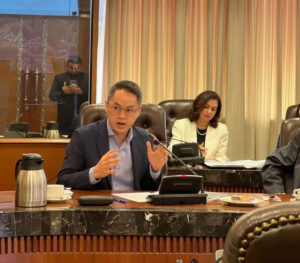The ASEAN Human Rights Declaration (AHRD) was drafted with the purpose of promoting and safeguarding human rights within the Association of Southeast Asian Nations (ASEAN). However, its impact and effectiveness have proven to be limited, highlighting ASEAN’s ongoing challenges in prioritising and addressing human rights concerns. This policy paper, co-authored by Edmund Bon Tai Soon and Umavathni Vathanaganthan, presents a comprehensive analysis of the AHRD’s evolution, implementation, and its role in shaping human rights discourse within ASEAN.
The historical foundation of the “ASEAN Way,” which emphasises non-interference among member states, has significantly hindered the advancement of human rights within the region. This approach has resulted in member states refraining from critiquing each other’s human rights records.
The early efforts to establish human rights mechanisms within ASEAN culminated in the establishment of the ASEAN Intergovernmental Commission on Human Rights (AICHR) and the subsequent AHRD. However, the AICHR’s role has primarily been promoting human rights rather than providing protective mechanisms. Its lack of investigative authority and accountability measures have restricted its ability to effectively address human rights violations. The process of drafting the AHRD was characterised by disagreements among member states, leading to a final document with diluted provisions.
The AHRD’s impact in addressing pressing human rights crises, such as the Rohingya crisis and Myanmar’s military coup, has been minimal. Although it has served as a common framework to discuss human rights and has facilitated some engagement, its limitations, and the weaknesses of the AICHR have undermined the AHRD’s effectiveness to provide meaningful human rights protection.
In conclusion, while the AHRD has provided a platform for dialogue on human rights and has facilitated certain engagement initiatives, its limitations underscore ASEAN’s ongoing challenges in prioritising human rights. These shortcomings raise significant questions about the AHRD’s relevance and its overall impact within the ASEAN region.
This article was published by Friedrich Naumann Foundation for Freedom, archived here.
With over 25 years of legal practice as an advocate in Malaysia, Edmund Bon Tai Soon brings extensive knowledge to his field. He represented Malaysia at the ASEAN Intergovernmental Commission on Human Rights (AICHR) from 2016 to 2018 and presently chairs the Malaysia National Working Group for an ASEAN Human Rights Mechanism. Additionally, he co-founded two civil society organisations, Malaysian Centre for Constitutionalism & Human Rights (MCCHR) and Collective of Applied Law & Legal Realism (CALR), and a blawg, LoyarBurok. Edmund is currently pursuing a doctorate in human rights and peace at the Institute of Human Rights and Peace Studies (IHRP), Mahidol University, Thailand. He holds a Master’s degree in International Human Rights Law from the University of Oxford, United Kingdom.
Umavathni Vathanaganthan serves as the Collective Operating Officer at Collective of Applied Law and Legal Realism (CALR), a non-profit organisation focusing on business and human rights, as well as ASEAN human rights advocacy. She holds a Bachelor of Social Science in International Studies from the University of Malaysia Sarawak (UNIMAS) and a Master of Arts in Human Rights from the University of Manchester, United Kingdom. Her professional background includes working at the ASEAN-Malaysia National Secretariat (AMNS), Ministry of Foreign Affairs Malaysia, and the Women’s Aid Organisation (WAO). Umavathni’s interests lie in foreign policy and human rights within Southeast Asia. She remains engaged in these areas through her involvement with the Working Group for an ASEAN Human Rights Mechanism (WGAHRM).



